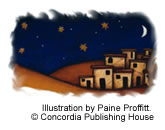by Susan Senechal
It was a week from hell. A friend, a young mother with two young daughters, is diagnosed with breast cancer. Another, whose children are the same ages as my own, is rushed to the ER with chest pains. My mom e-mails. Lately, she’s been getting tired and winded quickly so she has seen a doctor.
Twice before she’s had cancer—this time it’s a rapid, irregular heartbeat. She’s on medication for three weeks, and then the doctor will “shock” her heart into a regular rhythm. Until then, there’s a concern for blood clots and stroke.
My sister-in-law, whose twin sister died a year ago in a tragic car crash, now loses her mother to cancer just a week before Christmas. And on my own street, in a quiet suburban neighborhood, not more than a few doors down, two women are killed. Fear and police activity fill our street as a teenage neighbor is arrested for the murders. We try to shield our 5- and 7-year-olds from the ugliness as they see police cars and television crews, but there’s no shielding ourselves from the world gone dark. I’m overwhelmed.
 And so, a week before Christmas, I sit in the pew as we begin to sing “O Little Town of Bethlehem.” On the second line, tears begin to fall—“above thy deep and dreamless sleep”—that’s what I feel—a deep darkness and dreamlessness. The world seems to have been overtaken by the prince of darkness. There is so much pain and grief and suffering; how can we endure? And why all this suffering at Christmas, the season of good cheer?
And so, a week before Christmas, I sit in the pew as we begin to sing “O Little Town of Bethlehem.” On the second line, tears begin to fall—“above thy deep and dreamless sleep”—that’s what I feel—a deep darkness and dreamlessness. The world seems to have been overtaken by the prince of darkness. There is so much pain and grief and suffering; how can we endure? And why all this suffering at Christmas, the season of good cheer?
Despite my flood of tears, the song continues. Though I am unable to sing, I hear the words, “Yet in thy dark streets shineth the everlasting light,” and I know the darkness is temporary. Ps. 139:12 says, “Even the darkness will not be dark to You,” and Ps. 18:28, “My God turns my darkness into light.” That’s exactly what Christmas is about. John tells us, “The true Light that gives light to every man was coming into the world” (John 1:9).
Recently I learned when Jesus said, “I am the Light of the world,” it was at the end of the Feast of Tabernacles. This festival was known for the beauty of its lights. A ring of lights from camped pilgrims surrounded Jerusalem, and in the temple courts a giant menorah burned for seven days. But at the end of the feast, the light in the temple courts was put out, and as the pilgrims prepared to go home, it felt like the world was plunged into darkness. That’s when Jesus said, “I am the Light of the world. Whoever follows Me will never walk in darkness, but will have the Light of life” (John 8:12). God is the God of time and of timing—when our world is plunged into a darkness we cannot understand, He says, “Let there be light.” And “I am the Light.”
That night I turn out the lights in the living room and turn on the lights on my tree. As I look at the lights I remember God’s words, “The people living in darkness have seen a great light; on those living in the land of the shadow of death a light has dawned” (Matt. 4:16). And from the prophet Isaiah, “I will lead the blind by ways they have not known, along unfamiliar paths I will guide them; I will turn the darkness into light before them and make the rough places smooth. These are the things I will do; I will not forsake them” (Is. 42:16).
Despite the darkness of this world, there is a Light that darkness cannot overcome. I will let that Light be my guide.


